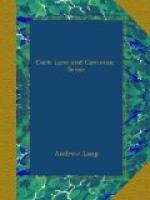As for the undeniable phenomenon that, in every land, age, and condition of culture, and in every stage of belief or disbelief, some observers have persistently asserted their experience of these occurrences; as for the phenomenon that the testimonies of Australian blacks, of Samoyeds, of Hurons, of Greeks, of European peasants, of the Catholic and the Covenanting clergy, and of some scientifically trained modern physicians and chemists, are all coincident, official physical science leaves these things to anthropology and folklore. Yet the coincidence of such strange testimony is a singular fact in human nature. Even people of open mind can, at present, say no more than that there is a great deal of smoke, a puzzling quantity, if there be no fire, and that either human nature is very easily deluded by simple conjuring tricks, or that, in all stages of culture, minds are subject to identical hallucinations. The whole hocus-pocus of ‘spirit-writing’ on slates and in pellets of paper, has been satisfactorily exposed and explained, as a rather simple kind of leger-de-main. But this was a purely modern sort of trickery; the old universal class of useless miracles, said to occur spontaneously, still presents problems of undeniable psychological interest.
For example, if it be granted, as apparently it was by Dr. Carpenter, that, in certain circumstances, certain persons, wide awake, can perform, in various ways, intelligent actions, and produce intelligent expressions automatically, without being conscious of what they are doing, then that fact is nearly as interesting and useful as the fact that we are descended from protozoa. Thus Dr. Carpenter says that, in ‘table-talking,’ ’cases have occasionally occurred in the experience of persons above suspicion of intentional deception, in which the answers given by the movements of tables were not only unknown to the questioners, but were even contrary to their belief at the time, and yet afterwards proved to be true. Such cases afford typical examples of the doctrine of unconscious cerebration, for in several of them it was capable of being distinctly shown that the answers, although contrary to the belief of the questioners at the time, were true to facts of which they had been formerly cognisant, but which had vanished from their recollection; the residua of these forgotten impressions giving rise to cerebral changes which prompted the responses without any consciousness on the part of the agents of the latent springs of their actions.’ It is, apparently, to be understood that, as the existence of latent unconscious knowledge was traced in ‘several’ cases, therefore the explanation held good in all cases, even where it could not be established as a fact.




